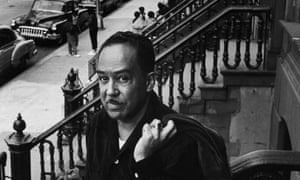Staying Alive – Real Poems for Unreal Times
In a rotten year, when public language has been poisoned by politics and prejudice, the personal integrity of poetry can keep us going

Holding fast to dreams … Langston Hughes on the steps of his house in Harlem, in 1958. Photograph: Robert W Kelley/Time Life Pictures/Getty Images
“Hope springs eternal”, declared Alexander Pope in 1733. More than ever this year have I needed hope – and I found it, nestled in the pages of poetry.
Earlier this summer, a word was hurled at me on the street by a stranger: “Leave.” Only one syllable and a second long, but it stayed with me. It was the day after the EU referendum results and in the two months since, racist incidents have been rising across the UK. Language itself seems to have been hijacked by toxic political discourse: small words such as “leave”, “immigrant”, “democracy”, “decent”, “human”, and “real” have taken on sinister meanings.
The word “real” was hijacked by Ukip, with Nigel Farage declaring Brexit a victory for “real people”. The title of a book on my shelf leapt out at me: Staying Alive: Real Poems for Unreal Times (one of a trilogy of Bloodaxe poetry anthologies, alongside Being Alive and Being Human). Dehumanising language is designed to cause despair. But reading cast off the accumulated layers of false meaning around the words, and gave language back to me. Who and what is real, and who and what is unreal? Poets have long been grappling with these ideas, as in TS Eliot’s haunting evocation of an “Unreal City”.
“If we look to poets for anything at a time when abuse of power goes hand in hand with abuse of language,” writes Neil Astley in the Staying Alive introduction, it’s for “their vigilance in defending and continually revitalising the language”. Here there are voices from across history and around the world, translated from languages as various as Persian and Polish, speaking of love and loss, of finding hope in the midst of despair. There is Rumi (reminding us to “Walk out like someone suddenly born into colour”). There is Yeats (“I, being poor, have only dreams”). There is Langston Hughes (encouraging us to “hold fast to dreams”). Some of the most poignant poems speak of the search for a home, and are a timely reminder of the crisis of refugees throughout history, such as WH Auden’s hugely powerful 1939 poem Refugee Blues:
“Say this city has ten million souls,
Some are living in mansions, some are living in holes:
Yet there’s no place for us, my dear, yet there’s no place for us.
[…]
The consul banged the table and said,
‘If you’ve got no passport you’re officially dead’:
But we are still alive, my dear, but we are still alive.”
Flowing through the lines of even the bleakest of poems is that assertion of life.
The title resonates in a year where death has taken some of our finest. How to stay hopeful when we lose those whom we love? I recently experienced the loss of a loved one, and I turned to poetry as a life raft. Poetry buoyed me up from sinking into despair; I memorise short poems so I can hold the whole of them in my head, so I can conjure them to mind when walking down a dark, lonely street.
As with all anthologies, it’s a book that makes us turn to other books. So from these pages, I discovered other poems I loved, and many were filled with hope:
“Hope is the thing with feathers
That perches in the soul —
And sings the tune without the words —
And never stops — at all — ”, wrote Emily Dickinson in 1891.
Astley writes: “In politics, television, newspapers and advertising, language is often negative, reductive, stripped of full expression to put across a message – it’s spun or twisted out of recognition … Instead of being used to communicate, it is used to control thinking, as a tool of power.” Poetry is the antidote to such abuse of words.
As the first leaves of autumn fall, I won’t leave these streets I call home. I won’t give in to fear and despair, I’ll stay, and stay alive.
No comments:
Post a Comment